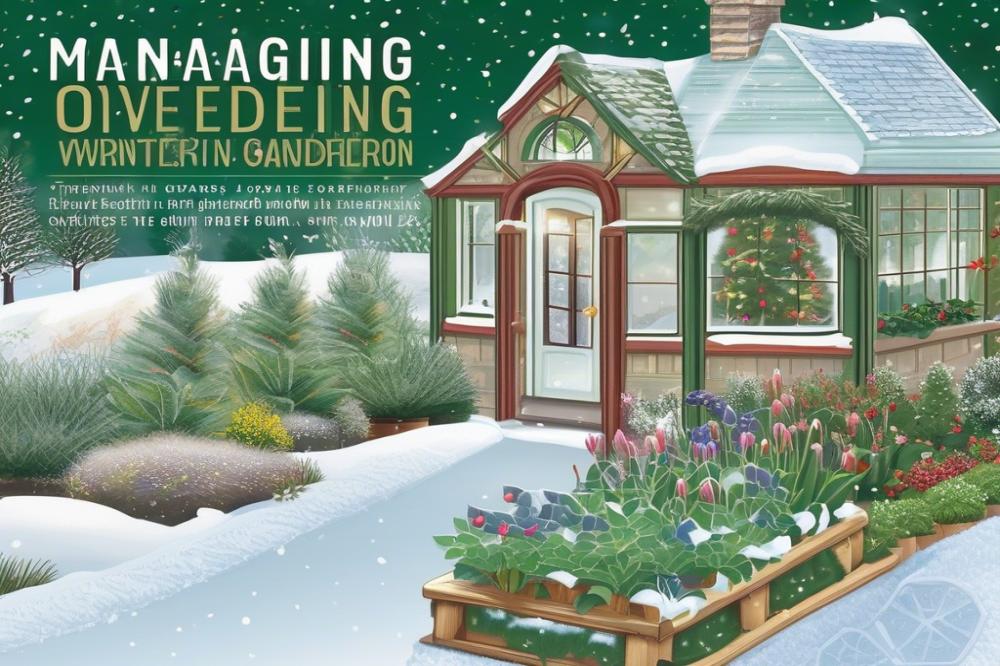Managing overwintering pests in Your Garden
overwintering pests can be a significant concern for gardeners during the colder months. These insect pests tend to take refuge in gardens, seeking shelter as temperatures drop. They can cause various issues for plants come spring. Preventive measures are essential to safeguard your garden and maintain soil health. Neglecting pest control can lead to damaged plants and stress for any gardener striving for success. Taking the time to manage these threats will pay off in the long run.
Healthy plants are the backbone of a thriving garden. Maintaining plant health is crucial, especially when pests linger over winter. Without proper management, these pests may reproduce and spread rapidly when temperatures rise again. A proactive approach allows gardeners to enjoy a lush, vibrant space when warmer seasons return. It’s important to realize that dealing with these insects is part of effective garden care.
Sustainable gardening methods provide excellent tools for pest management. Organic methods can reduce harm to beneficial insects and the surrounding ecosystem. Techniques such as mulching not only protect your garden but also improve soil maintenance over time. By incorporating these practices, one can create an environment less favorable to overwintering pests. The focus should always be on long-lasting solutions that promote health and biodiversity within your garden.
Ultimately, a well-planned strategy for garden pest management during winter can prepare you for a more prosperous gardening season. Embrace these practices to enhance your garden’s resilience against pests while fostering a healthier and more sustainable growing environment. It’s time to take action and ensure your garden flourishes all year round.
Understanding Overwintering Pests


Overwintering pests are insects that find a way to survive the cold months in gardens. They can include a variety of species, such as aphids, spider mites, and beetles. These critters seek out spots that provide shelter and some warmth during winter. Understanding what types are common can help in effective garden care.
The life cycles of insect pests play a significant role in their behavior during winter. Many pests enter a dormant stage, known as diapause, to survive harsh weather. Others might lay eggs that remain unhatched until conditions improve. This strategy helps them avoid freezing temperatures and find abundant food sources as spring arrives. Knowing their life cycles will help you prepare your pest control strategies.
During winter, these pests look for warm and protected areas in gardens. Logs, underbrush, and even the gaps in your garden structures provide favorable conditions. They often invade homes as well, seeking warmth and food. This exploration can damage plants and disrupt soil maintenance efforts. Understanding this behavior and the reasons behind it is vital for garden protection.
Many gardeners want to maintain healthy plants without relying on harsh chemicals. That’s where organic methods come in. These sustainable gardening practices can deter pests naturally. Keeping plants strong through proper soil maintenance creates less inviting conditions for overwintering creatures. Additionally, implementing preventive measures now can save time and effort later.
Overwintering pests may seem harmless when temperatures drop. However, ignoring them can lead to larger infestations when spring arrives. Therefore, remaining proactive in your garden plan is essential. By being aware of their habits and taking action, your plants will stay healthy and vibrant all year round.
Preventive Measures for Garden Protection


When it comes to holding back unwelcome visitors during winter, a proactive approach is essential. Implementing effective garden care can significantly reduce the chances of insect pests overwintering in your space. Start by practicing crop rotation. Changing the location of your plants each year helps disrupt pest life cycles. By doing so, you create a less predictable environment for any overwintering pests.
Soil maintenance deserves special attention. Healthy soil supports robust plant health, making it harder for pests to thrive. Regularly adding organic matter, like compost, improves soil structure and fertility. Additionally, well-maintained soil promotes strong root systems, which are crucial for battling pest invasions.
Sanitation is another key element in pest control. Cleaning up fallen leaves and debris removes potential hiding spots. A tidy garden not only looks good; it’s less inviting for those pesky critters. Make it a habit to clear away any dead plant material. This helps minimize the risk of harmful insect pests overwintering in your garden.
Creating inhospitable environments for pests doesn’t mean harming beneficial organisms. Consider planting companion crops that naturally repel certain pests. Some flowers, such as marigolds, can deter unwanted visitors while enriching your garden’s appeal. Utilizing natural varieties helps in maintaining a balanced ecosystem.
Protecting your garden requires consistent and thoughtful efforts. Consider introducing barriers like row covers. These can shield your plants from pests looking for a cozy place to winter. Each small step contributes to sustainable gardening and promotes a healthy environment for all your plants.
Organic Methods for Managing Overwintering Pests


Organic pest control strategies are essential for maintaining a healthy garden. Effective methods can be both friendly to the environment and beneficial for plant health. One strategy involves using natural predators. These beneficial insects can help reduce pest populations dramatically. For instance, ladybugs and lacewings are great at controlling aphids. Encouraging these predators in your garden can create a balanced ecosystem.
Barriers can also serve as a strong line of defense. Row covers or mesh can physically block pest access, protecting your plants. Setting up these barriers before pests arrive is a wise preventive measure. Additionally, you might consider using traps. Sticky traps can capture pests without harmful chemicals and help to monitor populations.
Another option to explore involves beneficial nematodes. These tiny organisms attack soil-dwelling pests. When applied correctly, they can target many troublesome insect pests during their vulnerable stages. This not only aids pest control but also enhances soil maintenance. You might find, over time, that they promote sustainable gardening practices.
Insecticidal soaps provide another organic solution. These soaps target soft-bodied pests like aphids and whiteflies. They work by suffocating the insects, leading to their eventual demise. When using such products, be sure to apply them in cool conditions to avoid harming plants.
Botanical pesticides offer additional avenues for garden protection. Derived from plants, these solutions can be effective against various pests too. Neem oil, for example, disrupts the life cycle of insects and deters feeding habits. It represents a unique approach that many organic gardeners value.
As you prepare for winter gardening, remember that proactive steps are vital. Implementing these organic methods not only aids in reducing overwintering pest populations but also supports overall soil and plant health. Through diligence and care, you can cultivate a thriving garden that is resilient against pests, and enjoyable to tend.
Winter Gardening Practices to Combat Pests


Effective garden care during winter can shape the success of your future crops. Implementing various techniques can significantly reduce pest control issues in your garden. Emphasizing organic methods gives you the upper hand in keeping your plants safe without harmful chemicals. Among the best strategies, mulching stands out as a simple yet powerful option.
Mulch acts as a barrier against cold weather while suppressing weed growth. Many gardeners choose to apply a thick layer of organic matter like leaves, straw, or wood chips. This practice not only protects your soil but also nourishes it as the materials break down. As a result, beneficial soil organisms thrive, which is crucial for maintaining plant health.
Another valuable technique is cover cropping. Planting certain crops during the winter months can shield your soil from erosion and promote soil maintenance. Legumes, for example, add nitrogen back into the ground while keeping harmful insects at bay. These crops create a living blanket, which helps deter unwanted pests and contributes positively to the overall ecosystem.
Don’t overlook the impact of protective structures like cold frames. These simple setups provide warmth and shelter for plants through harsh weather. Using cold frames not only protects your seedlings but also can create a microclimate that supports healthy plant growth. Consider building one to boost your winter gardening efforts.
Maintaining healthy soil is crucial in combating insect pests that may lurk beneath the surface. Healthy soil teems with life, supporting beneficial organisms that play a role in natural pest control. By focusing on soil health, you foster an environment where plants can grow robustly while reducing the risk of pest problems.
Implementing preventive measures now prepares your garden for successful future seasons. It is essential to think about sustainable gardening practices as you plan for the colder months. Each action taken this winter enhances your garden’s resilience against insect pests. All these methods combined create a comprehensive approach to ensuring a thriving garden, even in winter.
Monitoring and Identification of Pests
Pest control in your garden relies heavily on effective monitoring and identification. Garden care isn’t just about planting seeds or watering; it’s also about staying alert to unwelcome guests. Regular inspections help you catch problems before they escalate. Your eyes should be trained to spot signs of distress or damage on your plants.
Using traps can be a straightforward method to monitor insect pests. Sticky traps, for instance, can catch several common overwintering invaders. Another technique is to examine the soil and debris, as many pests like to hide. Look under leaves and within mulch. Both areas can provide clues about what’s lurking in your garden.
Mapping out sightings of pests can be beneficial as well. Create a simple log where you record your findings. Note the type of pest, location, and date. This will grant you a clearer picture of population dynamics. Patterns may emerge over time. Such records assist in planning preventive measures for the future.
Understanding the life cycles of certain pests can aid in your winter gardening strategy. Each insect has its unique habits and timing. Some might lay eggs in the soil, while others may hibernate in nooks. Knowing their behaviors can help you decide on organic methods to address issues. Initiatives focused on plant health and sustainability are essential for long-term garden protection.
Maintaining healthy soil plays a critical role in pest management. Healthy plants can withstand pest attacks better. Soil quality affects everything from the roots to the leaves. A robust ecosystem in your garden can decrease pest populations naturally. Therefore, keep an eye on soil conditions as you monitor your garden.
Awareness is your first line of defense for managing these pests effectively. By employing thoughtful strategies and staying vigilant, you can cultivate a thriving garden while minimizing pest risks. Remember, even a small amount of attention can lead to significant improvements in your garden’s health.
Wrapping Up: The Importance of Managing Pests
Maintaining a thriving garden involves more than just planting seeds and watering plants. Effective management of overwintering pests plays a significant role in sustainable gardening. These pests can disrupt the delicate balance of your garden ecosystem, leading to plant stress and loss. Addressing this issue is crucial for keeping your plants healthy and vibrant.
Adopting comprehensive pest control strategies is essential. This means taking a proactive approach with preventive measures to minimize pest problems before they arise. Simple practices such as removing debris and using natural barriers can make a considerable difference. Emphasizing organic methods not only benefits your garden but also promotes a healthier environment. You’ll find that nurturing the ecosystem in your backyard leads to long-lasting rewards.
Focusing on garden care brings numerous benefits. Healthy plants are more resistant to diseases and pests. You will notice that a well-maintained garden produces better yields and creates a more enjoyable outdoor space. Your efforts contribute to a thriving habitat for beneficial insects and wildlife as well.
In conclusion, managing pests is not just a task; it is a fundamental part of gardening. By implementing strategies that prioritize prevention and organic solutions, you are investing in the vitality of your garden. Encouraging a rich, healthy environment will elevate your gardening experience. The path to a flourishing garden begins with your commitment to safeguarding its wellbeing. Take action today, and enjoy the beauty and productivity your garden has to offer!



